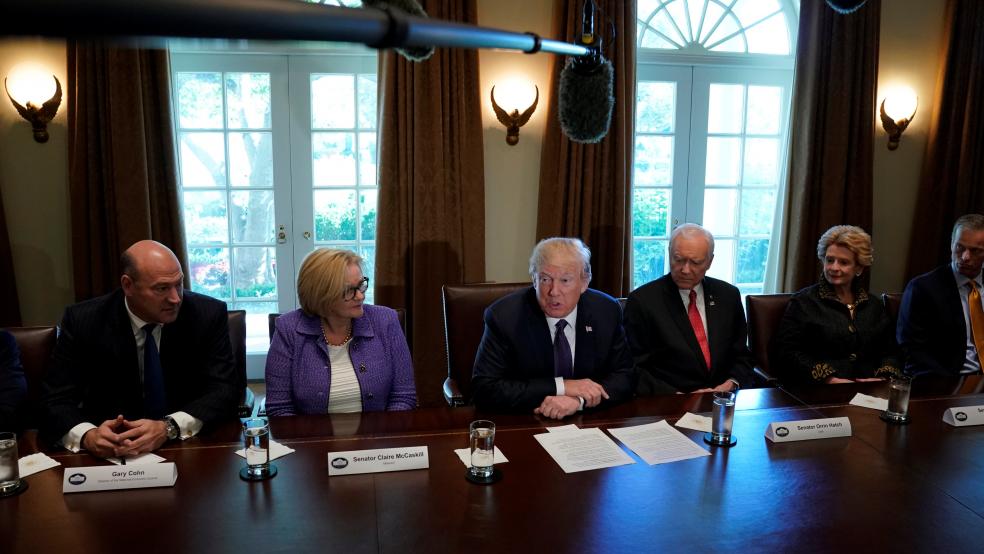They haven’t pushed the panic button just yet, but congressional Republicans and the Trump White House have little more than a month to act before triggering a meltdown in the nation’s health insurance system, with potentially catastrophic political consequences for their party.
House Speaker Paul Ryan (R-WI) and President Trump have promised to “save the country” from the high costs and shrinking availability of coverage under the Affordable Care Act. But almost nobody seriously thinks that Republicans can resolve their many differences and pass replacement legislation before the end of the year.
Related: How Chaos in the White House Makes Obamacare’s Problems Even Worse
That’s especially true now with Washington transfixed by a new special counsel’s investigation of possible collusion between the Russians and Trump’s 2016 campaign organization.
In the meantime, Obamacare is in a dangerous downward spiral that could accelerate the flight of insurers and threaten the coverage of many Americans next year with no plausible replacement in sight.
“This is really a meltdown of the individual insurance market – that’s what it really is,” said Joseph Antos, a health care expert with the American Enterprise Institute. “It could have been prevented because [Republicans] could have in essence removed the heat by providing concrete reassurance and throwing some money into the pot to prove to insurers that they were serious about it. They haven’t done it so far and I think they’ve almost run out of time to do anything about it.”
After bitter infighting and repeated delays, House Republicans narrowly approved the American Health Care Act on May 4 – highly controversial legislation that was largely dictated by the arch-conservative Freedom Caucus and Rep. Tom MacArthur, a moderate Republican from New Jersey. But that plan was virtually dead on arrival in the Senate, where more moderate Republicans are trying to craft an alternative that preserves more of Obamacare and prevents a rollback of Medicaid expansion.
A handful of Senate Republicans worried about a health insurance crisis in the individual market reportedly are discussing passing emergency short-term “stabilization” legislation to help prop up Obamacare until Congress can finally enact replacement legislation. Sens. Lamar Alexander and Bob Corker of Tennessee and John Thune of South Dakota are among the authors. However, their proposals would require a degree of cooperation and consensus among Republicans and Democrats that for now appears to be out of reach.
Related: GOP Plan Could Raise Premiums for 6 Million People with Pre-Existing Conditions
At this point, health care policy under the Republicans is in complete disarray. Already there are ominous signs that more major insurers will either pull out of the Obamacare market next year – as Aetna recently announced it will do -- or remain in the program but jack up their premiums to avoid massive financial losses.
Amid uncertainty over whether the Trump administration will cut off a vital $10 billion cost-sharing subsidy to the insurance industry used to bring down the out of pocket costs of low income people, major insurers are about to make important decisions with important consequences for many of the 12.2 million who enrolled this year.
Many insurers must decide by June 21 whether they will continue to participate in Obamacare next year or follow the path of Aetna, UnitedHealth Group, Humana, and Wellmark Blue Cross and Blue Shield to either pull out or drastically curtail their coverage in many states. Such a move would leave hundreds of thousands or even millions of people scrambling to find an alternative.
Already, some insurers that have tentatively decided to stick with Obamacare have filed for premium rate increases of as high as 40 percent to 54.3 percent in five states and the District of Columbia, according to a report by Vox.
Related: GOP Struggles to Explain AHCA’s $880 Billion Medicaid Cuts
For instance, Anthem is seeking a rate hike of 33.8 percent in Connecticut, where it currently covers 35,000 people, while BlueChoice has requested a 53.4 percent increase in Maryland that could impact 160,000 people.
At the same time, Health and Human Services Secretary Tom Price and other senior administration officials appear to be cheering on the demise of Obamacare and systematically undercutting its operations. The administration discouraged enrollments late last year by cutting back on promotional advertising. The Internal Revenue Service is withholding tax penalties for those who violate the law by not enrolling for coverage.
On Wednesday HHS took another step to weaken Obamacare by announcing that consumers can use Obamacare subsidies to purchase individual health insurance plans from a broker or an insurer’s website instead of purchasing it through the government insurance website, HealthCare.gov.
Trump, Ryan and Senate Majority Leader Mitch McConnell (R-KY) have insisted all along that the Affordable Care Act was fatally flawed with unworkable mandates, taxes, premium costs and subsidies that would collapse of its own weight. And given the way things are going, they may get their wish.
Related: How Trump Can Score a Big, Bipartisan Win on Health Care
But from a political standpoint, they will have a tough time making the case to millions of Americans who voted for Trump and the GOP and then lost their insurance that President Obama and the Democrats are to blame for their woes.
According to one report, the stabilization legislation being considered by a handful of Senate Republicans might include specific authorization to continue the cost-sharing subsidies for the insurance industry and to allow low-income families to use government subsidies to purchase coverage outside of the Obamacare exchanges.
“I think the idea of some kind of small bill actually making it through the process in any reasonable amount of time, it seems pretty unlikely given what we saw happen in the House,” Antos said. “I think that will be just a replay of what happened in the House, and I think that’s the kind of thing that just isn’t going to fly.”





